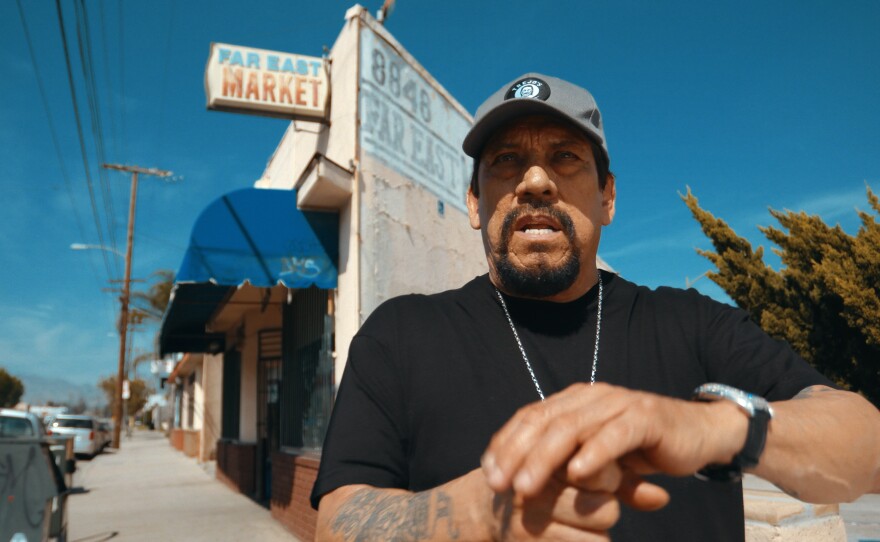Recommended viewing
"Blood In, Blood Out" (1993)
"Desperado" (1995)
"Heat" (1995)
"Spy Kids" (2001)
"Once Upon a Time in Mexico" (2003)
"Machete" (2010) and "Machete Kills" (2013)
Mexican-American actor Danny Trejo become a mainstream movie star at 66 when he was cast as the title character and got top billing in "Machete" in 2010. The new documentary "Inmate #1: The Rise of Danny Trejo" (starts streaming July 7) makes his life as riveting as any Hollywood movie.
Inmate #1 applies not just to the early roles Danny Trejo was cast in, but also to the reality of his time in prison.
"When you’re driving up to that wall at Quentin and you see that gun tower in front," Trejo recalls in the documentary. "You know that once you go in, you’re not coming out."
But Trejo did get out. The film’s a testament to the fact that change is possible even when things seem hopeless.
Trejo recounts how he had his first hit of heroin at 12, idolized his "gangster" uncle, ended up in prison, became a boxing champ there, and thought he would spend his life incarcerated or even face execution after a rock he threw hit a guard.
But Trejo had something of an epiphany in prison and decided to change the course of his life. He came out of prison to become a motivation speaker helping people fight addiction. Then, through a friend, he went up to the set of a prison film to help with boxing scenes. But while all the the extras on the set were trying to look tough, Trejo was the genuine article and he grabbed people's attention from his very first screen appearance in "Runaway Train" in 1985.
Trejo, with his extensive tattoos, imposing muscles, and lethal stare, was quickly cast in movies and slowly moved up from Inmate #1 roles to larger parts because he had talent as well as charisma. But his career took a major course change when he hooked up with director Robert Rodriguez (the doc explains that they later found out they were related through marriage).
Rodriguez saw more in Trejo than the stereotyped Mexican Hollywood saw. In "Desperado," Rodriguez cast him as a knife-throwing hit man who never spoke a word — and Trejo's intensity won him acclaim and more widespread fame. That was in 1995, and in 2001 Rodriguez cast him in his "Spy Kids" movie as Uncle Machete, allowing Trejo to show a softer side to his personality. This ultimately led to the character being featured in a "Grindhouse" trailer and then getting his own pair of films, "Machete" (2010) and "Machete Kills" (2013).
Trejo not only overcame the obstacles of race, economics and Hollywood standards of conventional heroes, he also overcame ageism to become a star at 66. But despite all his success (he now has added running restaurants to his credits) and fame, he still lives in Pacoima, where he grew up and his kids say at Christmas he drives around dressed as Santa and gives out presents.
Director Brett Harvey interviewed Trejo's friends, some of whom were incarcerated with him, family members, and as film colleagues such as Rodriguez, Cheech Marin, and Michelle Rodriguez.
Harvey does an excellent job of capturing many facets of Trejo's personality — his toughness, his vulnerability, his love of family, his willingness to take responsibility for both the good and the bad he has done.
Trejo talks about how attractive his uncle's gangster lifestyle was to a young kid and how that can pull someone in, but then he also reveals that he had not let himself cry about his mother's death until on the set of a Muppet film where Kermit the Frog offered him condolences and then Trejo said he just started to cry.
The film serves as a confessional for Trejo, whose life was a rollercoaster. He reveals how he navigated challenging terrain, not always making the best choices but ultimately finding success.
Harvey takes advantage of the access he has to Trejo’s life and crafts an insightful, thoughtful and beautifully executed portrait of this amazing person. The film plays like an engrossing drama and even though we may think we know Trejo's story, Harvey enlightens us to new details. He also gives the narrative a cinematic flourish in the way he shoots interviews and presents information.
"Inmate #1: The Rise of Danny Trejo" starts streaming July 7 on Amazon, AppleTV and other on demand platforms.






